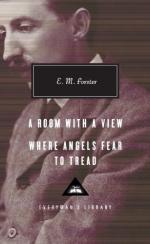“Singles or returns?” said he.
“A single for me,” said Harriet peevishly; “I shall never get back alive.”
“Sweet creature!” said her brother, suddenly breaking down. “How helpful you will be when we come to Signor Carella!”
“Do you suppose,” said Harriet, standing still among a whirl of porters—“do you suppose I am going to enter that man’s house?”
“Then what have you come for, pray? For ornament?”
“To see that you do your duty.”
“Oh, thanks!”
“So mother told me. For goodness sake get the tickets; here comes that hot woman again! She has the impudence to bow.”
“Mother told you, did she?” said Philip wrathfully, as he went to struggle for tickets at a slit so narrow that they were handed to him edgeways. Italy was beastly, and Florence station is the centre of beastly Italy. But he had a strange feeling that he was to blame for it all; that a little influx into him of virtue would make the whole land not beastly but amusing. For there was enchantment, he was sure of that; solid enchantment, which lay behind the porters and the screaming and the dust. He could see it in the terrific blue sky beneath which they travelled, in the whitened plain which gripped life tighter than a frost, in the exhausted reaches of the Arno, in the ruins of brown castles which stood quivering upon the hills. He could see it, though his head ached and his skin was twitching, though he was here as a puppet, and though his sister knew how he was here. There was nothing pleasant in that journey to Monteriano station. But nothing—not even the discomfort—was commonplace.
“But do people live inside?” asked Harriet. They had exchanged railway-carriage for the legno, and the legno had emerged from the withered trees, and had revealed to them their destination. Philip, to be annoying, answered “No.”
“What do they do there?” continued Harriet, with a frown.
“There is a caffe. A prison. A theatre. A church. Walls. A view.”
“Not for me, thank you,” said Harriet, after a weighty pause.
“Nobody asked you, Miss, you see. Now Lilia was asked by such a nice young gentleman, with curls all over his forehead, and teeth just as white as father makes them.” Then his manner changed. “But, Harriet, do you see nothing wonderful or attractive in that place—nothing at all?”
“Nothing at all. It’s frightful.”
“I know it is. But it’s old—awfully old.”
“Beauty is the only test,” said Harriet. “At least so you told me when I sketched old buildings—for the sake, I suppose, of making yourself unpleasant.”
“Oh, I’m perfectly right. But at the same time—I don’t know—so many things have happened here—people have lived so hard and so splendidly—I can’t explain.”
“I shouldn’t think you could. It doesn’t seem the best moment to begin your Italy mania. I thought you were cured of it by now. Instead, will you kindly tell me what you are going to do when you arrive. I do beg you will not be taken unawares this time.”




